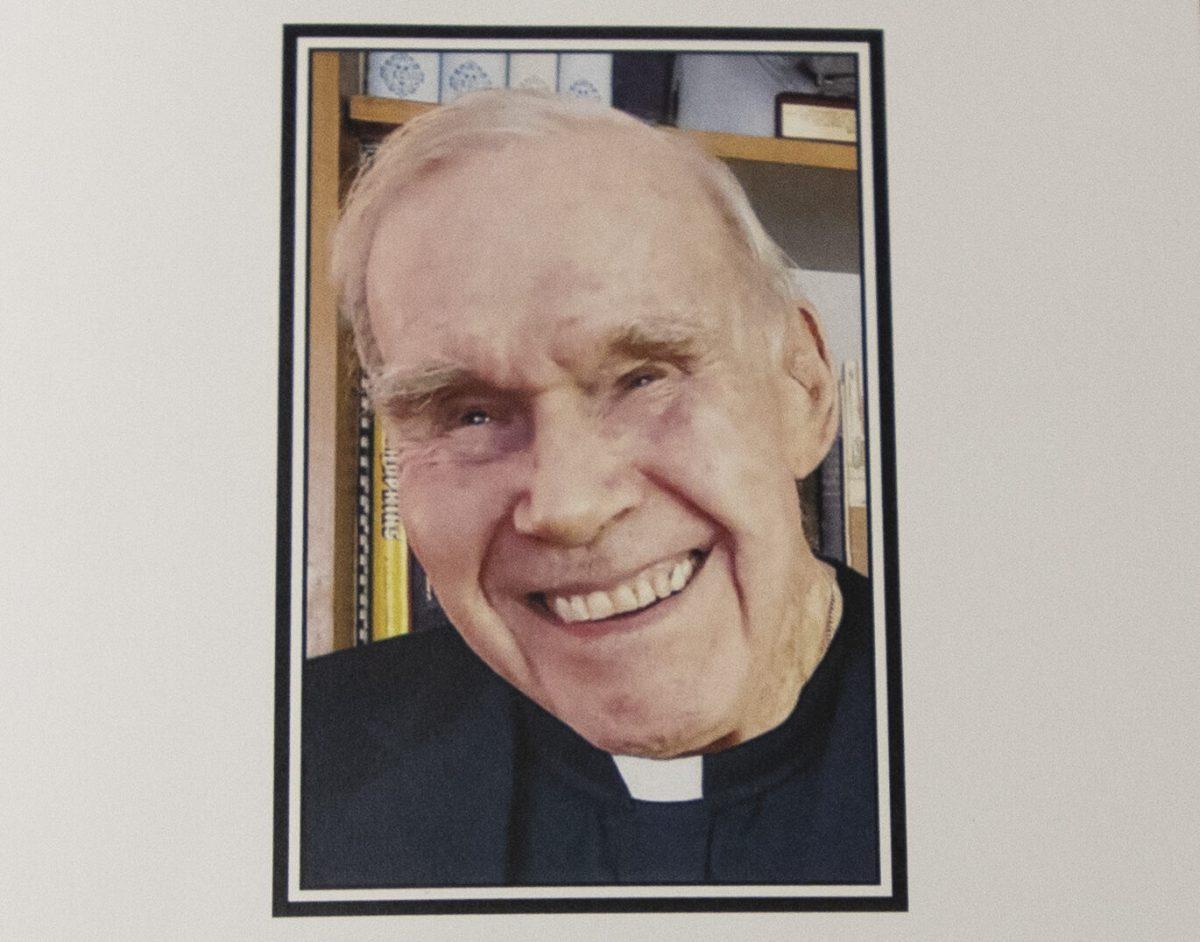Joseph Feeney, S.J., Ph.D., professor emeritus of English, died on Jan. 12 at the age of 88.
A native of Philadelphia, Feeney joined the St. Joe’s faculty in 1971 after earning a doctorate in English literature from the University of Pennsylvania and taught at the university for 43 years. His last class was in 2018, although he officially retired in 2015.
Feeney’s main focus of study was a fellow Jesuit, Gerard Manley Hopkins, S.J. Feeney published several books about the Victorian poet as well as facilitated translations of Hopkins’ work and co-edited The Hopkins Quarterly. Feeney also taught classes on Hopkins, along with those on modernism and postmodernism.
Amanda Murphy ’14, director of marketing and communications at the Kennett Library in Kennett Square, Pennsylvania, changed her major from political science to English after taking Feeney’s Craft of Language course as a first-year student. His spirit and jokes, including walking around the classroom yelling “corn” to disway his students from using corny phrases and clichés, stuck with her through her time at St. Joe’s.
“He changed everything,” Murphy said. “He was so lively, and he would bounce around the classroom. He touched my soul.”
Feeney’s sense of humor was frequently touched upon in remarks given by relatives and priests at his Jan. 19 funeral mass at St. Matthias Catholic Church in Bala Cynwyd. Kathleen Maher, a second cousin, said she’d met so many former students who told her about the impact Feeney had on them.
“We just heard everything,” Maher told those gathered in the church. “‘He was my mentor,’ ‘we had great fun,’ ‘he was the best teacher I ever had,’ ‘he changed my life,’ ‘he saved my life.’”
George Fenton, ’18, M.F.A., an adjunct instructor in creative writing at Temple University, was one of the last students to have Feeney as a professor. As a teacher himself now, Fenton said he learned more than just postmodernism from Feeney’s class.
“The greatest thing he taught me is how to be a compassionate educator, and how to find joy in sorrow,” Fenton said.
Michael Matulewicz ’09, a self-employed deputy docking pilot on the Delaware River, was another of Feeney’s students who vividly remembers how Feeney taught class, especially in regards to his values as a Jesuit priest.
He was, first and foremost, a priest, and he started every class with a short prayer,” Matulewicz said. “Most of the time he would have everybody sit in a circle to see each other. He was always present in that way. That was just part of him.”
AnnMarie Byrnes, a teacher at Holy Cross Preparatory Academy in Delran Township, New Jersey, was a student of Feeney’s in the 1970s. Feeney officiated at Brynes’ wedding as he did often for former students.
“He was always smiling,” Byrnes said. “He enjoyed life, and he wanted you to enjoy life too. He was just a great person to be around, and he made you feel special. And I felt that in class.”
Feeney was a part of the search committee in 1997 that hired Peter Norberg, Ph.D., professor of English and senior associate provost for academic and faculty support. Norberg became close with Feeney over time.
“He’s part of a very special generation of Jesuits, most of whom joined the order following World War II,” Norberg said. “That generation of Jesuits is really now leaving us, and they leave very big shoes to fill. My own commitment to higher education has been significantly formed by [Feeney] and Jesuits from the same generation, so it was an honor to know him.”
Erin Raftery ’15, communications manager for the Brookings Institution in Washington, D.C., first met Feeney while doing an interview for an article for The Hawk about the Catholic Church adapting in modern times.
“We had a very wide ranging conversation where we touched on gay marriage, all these kinds of culture clashes and everything like that,” Raftery said. “It was just amazing. He was a great guy and very insightful.”
Jo Alyson Parker, Ph.D., professor emerita of English, worked alongside Feeney and said he encapsulated the true meaning of a Jesuit education.
“Father Feeney epitomized the value of cura personalis, ‘the care of the whole person,’” Parker wrote in response to written questions from The Hawk. “It is a term that I had never heard before I came to St. Joe’s, and I would say that Father Feeney modeled that value for me in his relationships with students. His care for them inspired their love and devotion.”
Several of those students including Murphy, Raftery and Fenton were among the 100-plus people who attended Feeney’s funeral mass.
“There’s really no one else like him,” Murphy said.















































